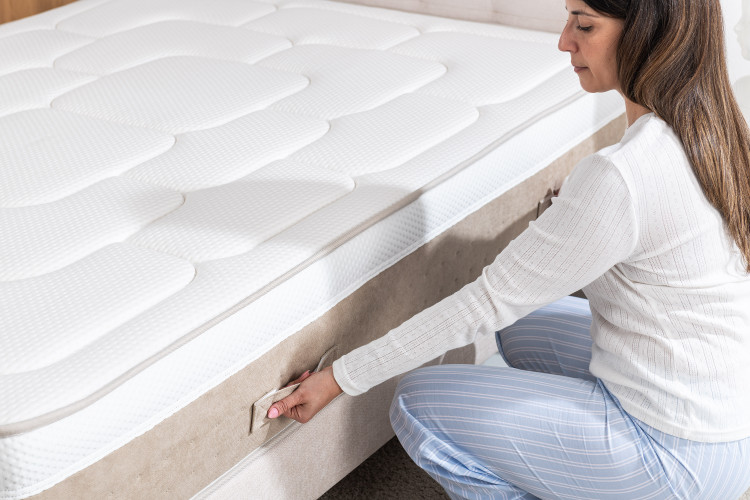Mattresses and allergies: how to choose the right model and avoid dust mites
Published by Leafsleep on 5th Sep 2025
Did you know that around a third of the Portuguese population suffers from some kind of allergy? Dust mites, fungi and bacteria accumulate easily on fabrics and surfaces, and the mattress is one of the most critical places. As we spend an average of one third of our lives sleeping, it is essential to ensure that the mattress contributes to our health rather than compromising it.
In this article, we'll explain how allergies are related to mattresses, which materials you should choose and what precautions will help keep you allergen-free.
What are the most common allergies associated with mattresses?
Mattresses are favorable environments for the proliferation of microscopic organisms that trigger allergic reactions. The main problems include:
- Dust mites - the main cause of allergic rhinitis, night coughs and asthma attacks.
- Fungi and molds - develop in humid environments and can cause respiratory problems.
- Skin allergies - caused by contact with irritating fabrics or chemicals.
If you wake up frequently with sneezing, nasal congestion, itchy eyes or skin irritation, the mattress could be aggravating your symptoms.
What to look for in an allergy mattress?
Choosing the right mattress is a fundamental step towards improving the quality of life of allergy sufferers. Here are the essential criteria:
- Hypoallergenic materials
Choose mattresses made with high-quality foams and natural fabrics, such as cotton or Tencel™, which reduce dust accumulation and are breathable.
- OEKO-TEX® certification
A certified mattress guarantees the absence of substances harmful to the skin and the body, which is essential for sensitive people and children.
- Good ventilation
Air circulation is crucial to avoid humidity, dust mites and bad odors. Mattresses with breathable technology, such as Leafsleep's BioCell®, promote a healthier sleeping environment.
Leafsleep mattresses for allergy sufferers
We develop mattresses that combine innovation, comfort and health, ideal for people with allergies or sensitive skin:
- Nature Cloud Cotton mattress - combines natural cotton and BioCell® foam, providing freshness, softness and hypoallergenic properties.
- Nature Cloud Visco mattress - incorporates the latest generation of Tencel™ and viscoelastic, guaranteeing thermal regulation and protection against dust mites.
Both models are OEKO-TEX® certified, ensuring that they contain no harmful chemicals.
How to keep your mattress allergen-free
Even when choosing a suitable mattress, it's important to adopt some maintenance habits:
- Use a hypoallergenic, washable and waterproof mattress protector.
- Vacuum regularly with a vacuum cleaner fitted with a HEPA filter.
- Air the room and the mattress as often as possible to avoid moisture accumulation.
- Wash bed linen weekly at temperatures above 60 °C to eliminate dust mites.
- Rotate and flip the mattress every 3 to 6 months to ensure it lasts longer.
When should you replace your mattress?
Even with all the care taken, there comes a time when the mattress no longer guarantees comfort and hygiene. The average lifespan of a mattress is 7 years, and it can reach this period with frequent use and care to keep it in excellent condition.
If after this period you feel that your allergy symptoms get worse when you wake up, it may be time to invest in a new model.
Mattresses and Allergies
What is the best mattress for allergy sufferers?
Mattresses with hypoallergenic, breathable and certified materials such as Tencel™, natural cotton and BioCell® foam are ideal.
What is a hypoallergenic mattress?
It is a mattress made with materials that reduce the accumulation of dust and mites and do not contain harmful chemicals.
Is OEKO-TEX® certification important?
Yes, it ensures that the mattress has been tested against substances harmful to health.
Apart from the mattress, what can I do to reduce allergies in the bedroom?
Use hypoallergenic mattress protectors and pillows, wash bed linen frequently and keep the room ventilated.
Allergies affect health, well-being and sleep quality. A certified hypoallergenic mattress, combined with proper hygiene habits, makes all the difference in controlling symptoms.
We believe that healthy sleep begins with the right choice. Discover our Nature Cloud Cotton and Nature Cloud Visco mattresses, developed to offer not only comfort and durability, but also a safe and allergen-free rest.

